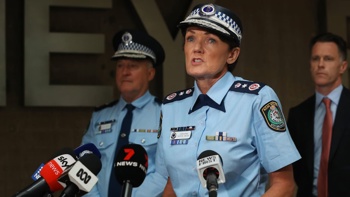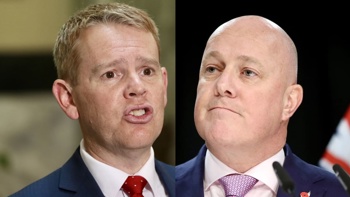Well today if you don't want to listen to Newstalk ZB can I suggest you tune into Radio Hauraki.
You won't often hear a presenter say that because every listener is precious and you don't want to invite them to leave. But I'm pretty sure that if ZB is your station and you sample Hauraki, you'll enjoy it, but you'll be back soon enough.
But there's a reason for me telling you to listen to Hauraki today. They're pulling a stunt but it's a stunt with a heart and a serious message.
Today, Radio Hauraki is not talking. They're cutting all announcers, all news, all weather and, most surprisingly for a commercial radio station, all ads,
Now a station that only plays music sounds pretty sweet but it's not a ratings trick but a bid to raise awareness for men's mental health.
They're calling it "No Talk Day" and it has a slogan, of course, "We're not talking, to get men to start."
This counter-intuitive idea is to highlight how men in particular, when faced with bad times, clam up. They don't look for help. They don't reach out. They don't talk. When I first heard the idea I thought it was bonkers as the station is doing exactly what they say men shouldn't. They're clamming up. Surely they should be talking more. Talking about feelings, hopes and fears and how to cope with the maelstrom that is emotion.
Turns out Hauraki is still talking. The only people you will hear between the tunes are well-known New Zealanders sharing personal stories about their experiences with mental health issues. They'll be telling men in particular to talk.
So all this raises interesting questions that the media face all the time. When we talk about suicide in the media we don't talk about it. When well known New Zealanders “die suddenly” and “police say there are no suspicious circumstances” we all know damn well that they've committed suicide.
When papers write up these sudden deaths and place a slew of emergency contact numbers below it then again we know what's happened. But not exactly what happened.
The thinking behind the media not stating that the cause of death was self inflicted is to stop the glamourisation of suicide. It's the “death that shall not be named” in case other vulnerable people are suddenly inspired by a well known person's suicide.
This is self delusional balderdash in my opinion. I have known far too many “well known” people who have committed suicide. Not only has the s word never been associated with their name but the manner of their deaths are not known.
Most of those details are horrific. The violence and the pain. Even worse are the partially successful attempts that left the person trying to leave a world of emotional pain in a world of physical pain and suffering beyond comprehension.
We need to talk more and more honestly. The polite dancing around the horror of suicide does more to glamourise it than anything else.
WHERE TO GET HELP:
If you are worried about your or someone else's mental health, the best place to get help is your GP or local mental health provider. However, if you or someone else is in danger or endangering others, call 111.
If you need to talk to someone, the following free helplines operate 24/7:
DEPRESSION HELPLINE: 0800 111 757
LIFELINE: 0800 543 354
NEED TO TALK? Call or text 1737
SAMARITANS: 0800 726 666
YOUTHLINE: 0800 376 633 or text 234
There are lots of places to get support. For others, click here.
Take your Radio, Podcasts and Music with you









